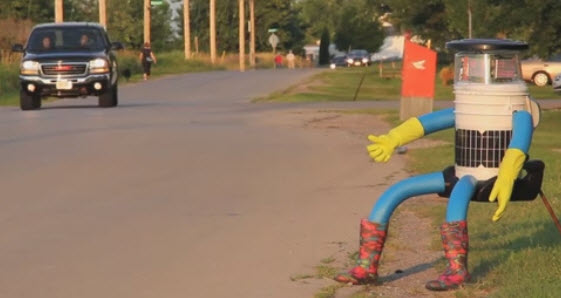Can we trust robots? Better question: can robots trust us?
August 24, 2014

HitchBOT (credit: Frauke Zeller and David Harris Smith)
Ask HitchBOT, a charismatic robot who just hitchhiked its way across Canada from Halifax, N.S. to Victoria, B.C. — a three-week journey of more than 6,000 km (3728 miles) — accepting 18 rides from total strangers and tweeting its progress to its 35,100 followers.
@HitchBOT used GPS and a 3G cellphone wireless connection feeding to a map with its position. It has a face made from LED lights to show expressions, a body wrapped in solar panels, a mind created with Cleverbot-based chatbot software (with voice-recognition and speech ability), and social-media and Wikipedia APIs.
“My fashion sense could be described as ‘hardware-store chic’ since I wear a garbage-can hat, my torso is made of a plastic beer pail, my arms are made of pool noodles, and my head and brain are protected by a plastic cake saver,” HitchBOT says on its Facts About Me page.

HitchBOT relied on strangers to keep it charged by car lighters
HitchBOT’s creators are Frauke Zeller (Ryerson University) and David Smith (McMaster University), aided by other researchers at Ryerson University, University of Toronto, and McMaster University. “With their research assistants in communication, multimedia, and mechatronics, this team has brought hitchBOT to life to explore topics in human-robot-interaction and to test technologies in artificial intelligence and speech recognition and processing,” according to the team’s press release.